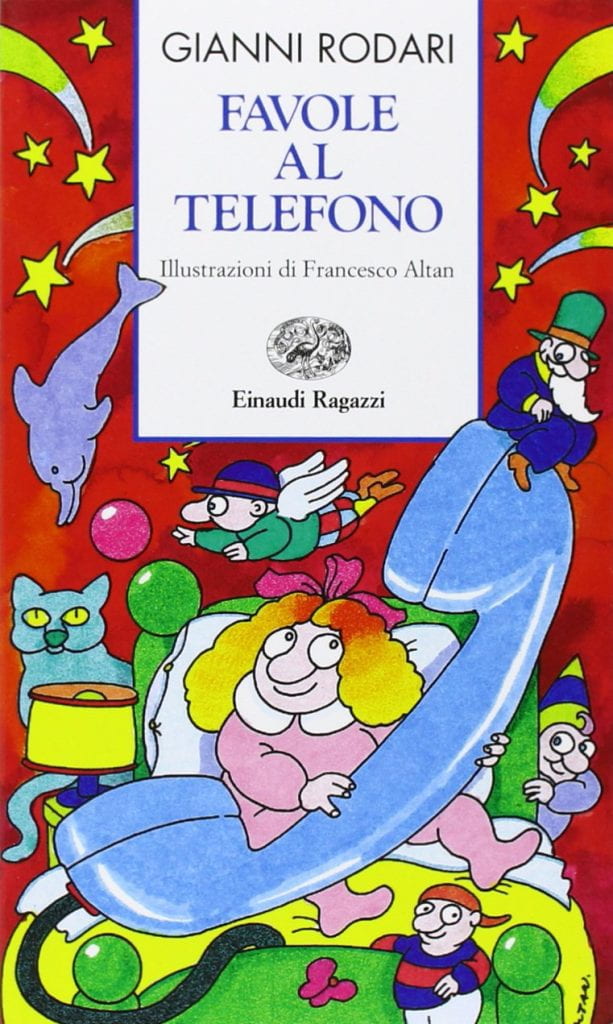
Gianni Rodari (1920 – 1980) was a notable Italian writer, famous for his prolific output in the field of children’s literature. Published in 1962, Favole al telefono (“Telephone Tales”) is a collection of fables based on an ingenious literary device. A travelling salesman phones home every day to tell a bedtime story to his daughter. Since trunk calls are expensive, all stories are concise and self-contained, with the plots based on modern everyday situations enhanced by fantasy, supernatural, or other highly imaginative elements.
Il muratore della Valtellina (the mason from Valtellina) is unusual for being one of the few examples of children literature dealing with the bombing war. This story is based on two aspects: that of the mason is entombed in concrete and becomes the sentient awareness of the building he was constructing; and the people who live in the same house who are killed when a bomb hits it.
Valtellina is a poor mountainous region in North-West Italy, from which young men have historically migrated to more developed places. In keeping with that, Mario goes to Germany to find work, but his hopes are shattered twice: initially when he died and subsequently when then building when he dies and when the building he helped constructing was destroyed. This parallelism adds poignancy to the plot.
The story is also notable for the light-hearted treatment of two horrific themes; a deadly work accident with a supernatural twist and the harsh reality of the bombing war. The disturbing contrast between the gruesome content and the dreamlike quality of Rodari’s writing makes the story the modern equivalent of some folkloric material, especially the German fables edited by the Grimm brothers which are notable for combining imaginative elements with a great deal of dark themes such as violence, viciousness, and killing. An unrecoverable corpse hidden inside a concrete pillar is also a recurring trope in organised crime fiction, which undoubtedly strikes a jarring note in children’s story.
Il muratore della Valtellina is set in Berlin and the fact that the victims are caught in their sleep implicitly suggest a RAF night-time operation. The end conveys an anti-war sentiment, although delivered from an unconventional angle. We become part of what we built or what we use: these things are not neutral but are imbued with our hopes and aspirations. Destroying them – admonishes Rodari – is destroying a part of ourselves.
The translation below has been prepared for this post
The mason from Valtellina
A young man from Valtellina, unable to find work at home, migrated to Germany and found employment as a mason in a construction site in Berlin. Mario – as he was known – was really happy: he worked hard, ate frugally, and saved what he could for marriage.
One day, while working on the foundations of a new building, a walkway collapsed. Mario fell into the concrete mould, died, and the body couldn’t be recovered. Mario indeed died, but he was unable feel pain. He was trapped inside one of pillars of the building under construction – it was a bit of a tight spot, but other than that he could think and hear as before.
Once he got used to his new state, he could even open his eyes and see the house that was growing around you. It was like he was supporting the weight of the new building, and consequently this offset the ensuing sadness of not being able to send news home, to his poor fiancée.
Hidden inside the wall, in the very heart of the structure, nobody could see him or even suspect that he was there, but Mario did not care. It rose until the roof was built, doors and windows fitted, the flats put on the market and sold, furnished, and eventually many families moved in. Mario got to know all of them, the young and the old alike.
When toddlers scuttled across the floor, practicing their walk, they tickled his hand. When young women were going out on the balconies or leaning out of the windows to see their boyfriends walking by, Mario could feel the gentle swish of their blonde hair against his cheek.
Mario listened to the families talking over their evening meals, them settling for the night and the baker rising before dawn is response to his alarm clock – the first to arise in the morning. Mario lived the highs and lows of the building making those moments his own.
One day war broke out. The whole city was bombed, and Mario felt the end was near. A bomb hit the house, which tumbled down. All that remained was a shapeless pile of debris, shattered furniture, and flattened chattel. Beneath were the families caught in their sleep. Only once both the building and the families who inhabited had died could Mario himself actually die for the house that was born out of his sacrifice died as well.
Source: Rodari, Gianni; Altan (1995): Favole al telefono. Torino: Einaudi ragazzi.
Translated by author; proofread by Claire Campbell.
